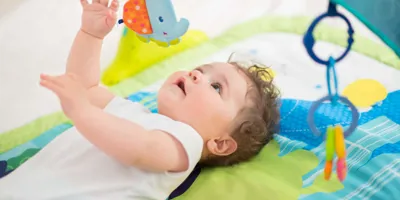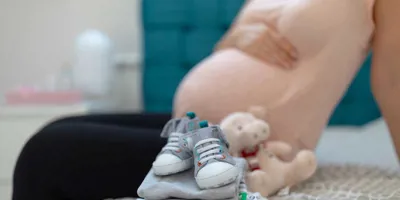
‘Why does my baby cry all the time?’ – it’s a common question. There are limits to communicating through crying. If you are confused about your baby’s needs, investigate these 8 possible causes for tears.
Why is my newborn baby crying?
1. Colic
Do you find yourself asking ‘why is my newborn baby crying all the time?’ One answer you might hear a lot is colic. This is a prolonged crying that seems to be caused by abdominal pain and is often the underlying condition when your baby cries a lot with no obvious cause. Colic is not dangerous and should get better on its own, but you should take your baby to the GP to rule out any other causes of persistent crying.
2. Hunger
Why do newborns cry when you can’t see anything wrong? The simplest reason for a baby to cry is to signal that they are hungry. This will happen regularly during the day (and night, sorry) and a regular appetite is a good sign of health. If your baby seems to lean for the breast when held by their mother or shows a positive reaction when you begin to feed them, this is almost definitely the reason for the tears. If your baby is crying while breastfeeding or bottle-feeding, there could be a few reasons for this. Fussing at the start of breastfeeding might be hunger or impatience for milk. If your baby cries right after feeding, they might need to burp, or to transfer to the other breast (or another bottle!) for more milk.
3. Discomfort
A common cause of discomfort in babies is irritation of their sensitive skin. Baby rashes are common and there’s unfortunately no immediate cure for this kind of discomfort. You can reduce it by using a gentle lotion (either baby lotion, oil or something prescribed by the doctor) when washing them.
Scratchy tissues might irritate a baby’s delicate skin and cause more discomfort. With gentle Cushelle tissues you can be sure that your baby is comfortable while you wipe up mess or excess lotion.
4. Wind
Babies get wind when they swallow air while feeding but this also happens when they cry! Signs of wind are: abruptly stopping in the middle of feeding, or if your baby cries a lot and squirms when they are put down after a feed. To get your baby to burp, sit them up after a feed or hold them over your shoulder and gently rub and pat them on the back.
5. Wants affection and attention
Sometimes your baby will just want to be held! Young babies are comforted by the smell, warmth and sound of their mother’s body. When your baby wakes up crying, try singing, swaying or walking around with them in a sling.
6. Exhaustion
Tears mean they could be tired or overstimulated, especially if you’re wondering ‘why is my newborn crying?’ in the evening. You will know if your baby hasn’t had a good night’s rest because you’ll be feeling the effects of it yourself!
7. Too hot or too cold
If none of the above seem to be the cause, check if your baby is appropriately dressed for the temperature. If you notice that your baby’s body temperature is unusually high or low, seek medical advice.
8. Illness
Pay attention to how the crying sounds: sickness-related crying has a different tone to other kinds of tears. Babies catch common colds a lot and this is nothing to worry about. If you notice that your baby’s crying sounds very different, seek medical advice immediately.
Reasons why babies cry in their sleep?
Interested in why is my baby crying at night rather than in the day? Babies usually wake from their sleep and cry for any and all of the reasons above. If your baby wakes up crying, it’s because they need something: food, nappy change, or just a little cuddle.
If your baby cries without waking, then you usually don’t have to attend to them in the same way you would if they were awake. If you’re looking for reasons why newborns cry when going to sleep, it’s probably because they’re moving from light sleep into deep sleep. To make sure they get a proper rest it’s best to leave them to comfort themselves.
Related articles
4 tips on how to blow baby’s nose
Learn how to blow a baby's nose and how to teach nose blowing to older children with this guide on how to clean baby nose blockages.

Baby development milestones: What to expect
Discover what to expect in your little one’s first two years with this month-by-month guide to the baby development milestones. Click here for more.

Baby Activities: Play Ideas for Their First Year
Looking for activities to do with babies? Click here to discover an age-by-age list of baby activities that the whole family can get involved with.

Labour checklist: What to pack in a baby hospital bag
Packing a hospital bag full of essential items can be a real lifesaver for new mums. Our hospital bag checklist for mum and baby will ensure you have all you need.

How to travel with kids: the essential holiday checklist for families
Need some advice on how to go on holiday with kids? Our top tips and holiday with kids checklist will help you make it the best family break ever.

2 DIY fine motor skills games for kids' development
Looking for fine motor skills activities? Discover Cushelle’s DIY fine motor skills games for your child’s development here!



